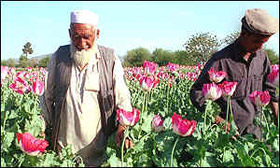 |
 |
 |
 Health & Beauty | June 2005 Health & Beauty | June 2005  
Iraq: The New Heroin Route
 Arnaud Aubron - Libération Arnaud Aubron - Libération


| | Losing war on drugs: Iran is on the heroin supply route from Asia to Europe. |
Opiates - and cannabis - produced in Afghanistan transit through Iraq before being distributed in Europe. Their consumption is growing in Baghdad and elsewhere.

Repeat yet again. Although Washington took the lead thirty years ago in the global anti-drug war, narcotics seem to stubbornly want to surge through the wake of the American Army.

Thus, in 2001, following the prohibition of poppy cultivation by the Taliban, Afghanistan had seen its opium production fall by 185 tons... to shoot up to 3,200 tons (or a 1,700% increase) immediately after the United States' intervention, a scenario that is finding an echo today in Iraq. According to the Iranian Hamid Ghodse, President of the OICS (Organe international de contrôle des stupéfiants, an expert group headquartered in Vienna charged with applying UN conventions relating to drugs), Iraq is in the process of becoming an important transit country on the route for Afghan heroin. Opiates and cannabis produced in Afghanistan "are brought through Iraq to Jordan from where they are sent on to the European markets of the East and West," he declared during a press conference given Thursday in Vienna.

This tendency is confirmed by the rise in narcotics seizures along the Iraqi-Jordanian border the last twelve months. "This situation is made possible by the domestic situation in Iraq, where border controls have been loosened and traffickers can come through disguised as pilgrims" going to the great Shiite cities, propounded Hamid Ghodse, for whom the situation is comparable to that of most countries emerging from a conflict situation.

While drug problems have been historically unknown in Iraq (out of fear of repression striking traffickers and consumers or quite simply from lack of information), OICS has worried about the new trend since its March 2004 annual report. "Drugs have started to enter the country in huge quantities, notably through the Eastern border," with Iran, revealed Iraqi Minister of the Interior Nouri Badrane then, who worried especially about the increase in narcotics consumption among young Iraqis: "Consumption of these drugs is on the rise, due to unemployment, insecurity, and the sense of uncertainty about the future, especially among young people." A few months later, his equivalent at the Health Ministry talked about "a problem that has become endemic," submitting a number of 2,029 registered addicts.

A trend confirmed this year by Hamid Ghodse, who, on Thursday, inventoried a troubling increase in the number of addicts treated in the capital's hospitals, but also in other cities in the country. To confront the situation, Baghdad has adopted a national anti-narcotics plan. "It's urgent that the Iraqi government and the international community take the preventative measures the situation requires before it becomes worse," Hamid Ghodse concluded.

A deterioration that Washington, which for the moment has other priorities, could also pay the price for. If drug consumption by GIs is not at present the subject of any study, the highlight of the June 2004 edition of the magazine "High Times" (specializing in cannabis) was a GI in Iraq posing next to a cannabis plant. In 1971, 11% of GIs based in Vietnam declared that they consumed heroin regularly, while one in five said that they had tried it.[1] It was following their return to the United States that Nixon decided to launch his global war on drugs. | 
 | |
 |



